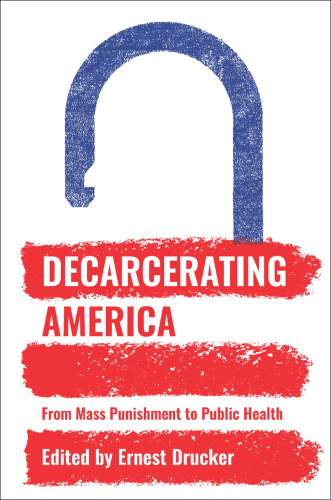
Decarcerating America
From Mass Punishment to Public Health
کتاب های مرتبط
- اطلاعات
- نقد و بررسی
- دیدگاه کاربران
نقد و بررسی

February 1, 2018
Citing growing public acceptance that mass incarceration has failed, Drucker (global public health, New York Univ.; epidemiology, Columbia Univ.; A Plague of Prisons) has assembled articles written by academics, activists, and clinicians outlining the complex process of decarceration. This volume reflects the view that a new model based on public health and restorative justice must replace the current punitive and racially biased prison system. The book is well-organized around three types of prevention strategies. Topics include successful primary prevention in New York and California where data supports the finding that prisoner reduction can enhance public safety, the role of criminal justice system actors in diverting offenders, and the significance of drug policy reform in this process. Secondary intervention studies of the negative impact of parental incarceration and prison health risks are reviewed, and controversial proposals regarding the release of violent offenders and others are presented. The work concludes with discussions of tertiary prevention issues covering prisoner reintegration and harm-reduction programs and the effects of downsizing on prison-based towns. Articles tend to be uniform in length and quality. Threats to the implementation of such reforms in the current political climate are acknowledged. VERDICT Passionate, provocative, and well documented, this wide-ranging survey is recommended for students, activists, and policy makers in correctional settings.--Antoinette Brinkman, formerly with Southwest Indiana Mental Health Ctr. Lib., Evansville
Copyright 2018 Library Journal, LLC Used with permission.

February 1, 2018
An urgent anthology suggesting progressive approaches to ending the era of overimprisonment."Mass incarceration is destroying hundreds of communities and millions of families across America," writes editor Drucker (Global Public Health/New York Univ.; A Plague of Prisons: The Epidemiology of Mass Incarceration in America, 2011, etc.), who views this tangled situation as a matter of public health. That discipline, he writes, "has a well-developed model of prevention that breaks interventions into primary, secondary, and tertiary stages....I have drawn on these concepts and organized the book in three parts that mirror these three categories." Essays in the first section thus focus on reducing the number of people entering prisons and jails, the "front door" approach. The contributors discuss the counterintuitive narratives of New York City and California. Previously focused on tough-on-crime approaches, their "unprecedented reduction in reliance on incarceration has been a bottom-up, advocacy-driven, community-focused strategy." Other perspectives come from public defenders, who testify to the corrosive nature of the process by observing, "an arrest is never just an arrest," and a judge who ponders how he "can and should act to minimize the blight of mass incarceration." The discussions of secondary-level interventions focus on improving prison conditions, examining the complex issue of children of imprisoned parents, and looking at controversial reconsiderations of responses to violence. Finally, the tertiary discussion focuses on facilitating harm reduction as former prisoners re-enter their communities, in terms of reconciliation with survivors of violence, preventing recidivism and drug relapses, and even refashioning the economies of "prison towns." The strengths of the anthology are the evidence-based clarity of each chapter's discussion and their thoroughness in examining distinct aspects of mass incarceration. Still, as Drucker and some contributors acknowledge, their initiatives are unlikely to move forward beyond the local level during the Trump presidency and its call for "long mandatory sentences and a resumption of the failed war on drugs."A unified and hopeful collection that should interest attorneys, activists, and open-minded law enforcement professionals.
COPYRIGHT(2018) Kirkus Reviews, ALL RIGHTS RESERVED.

























دیدگاه کاربران